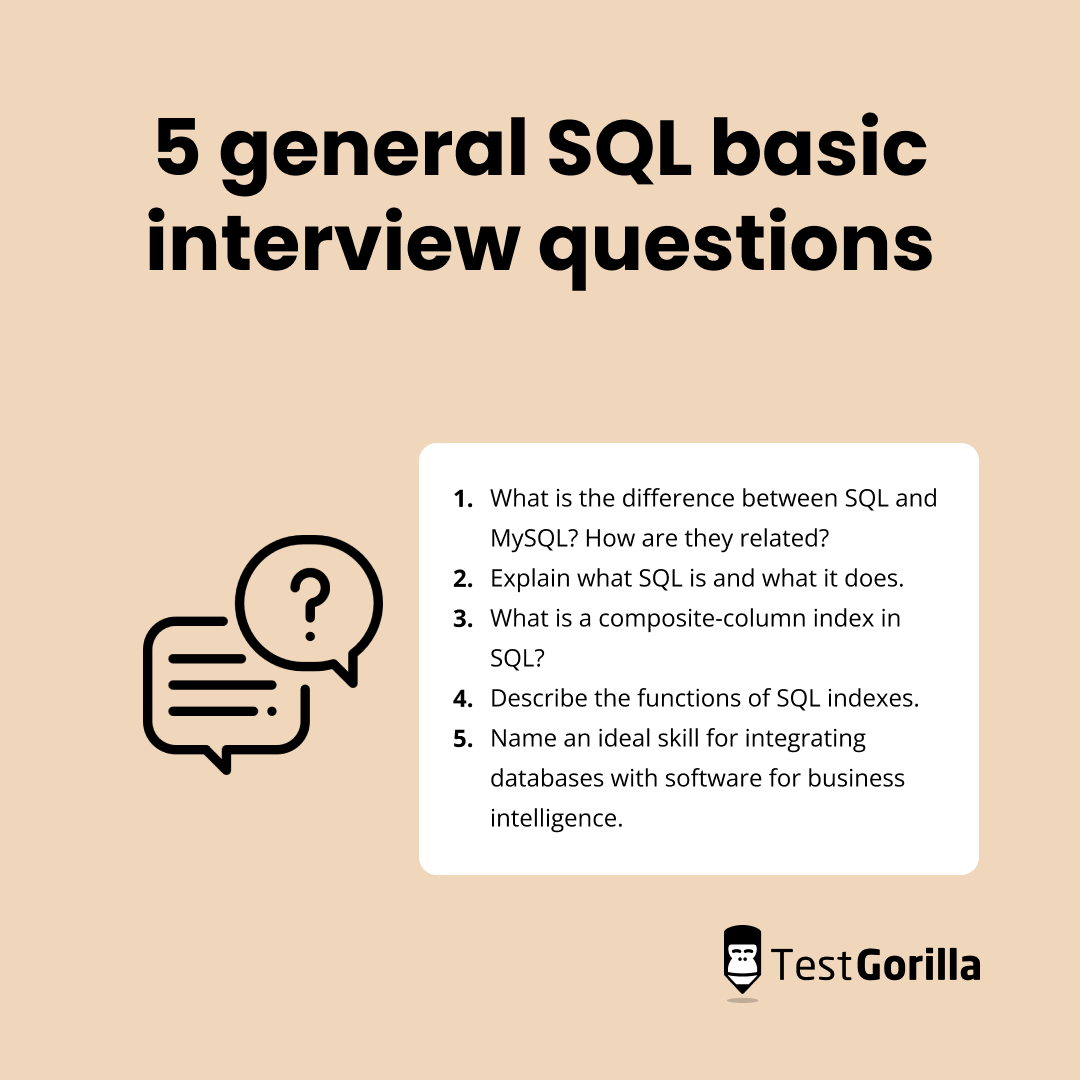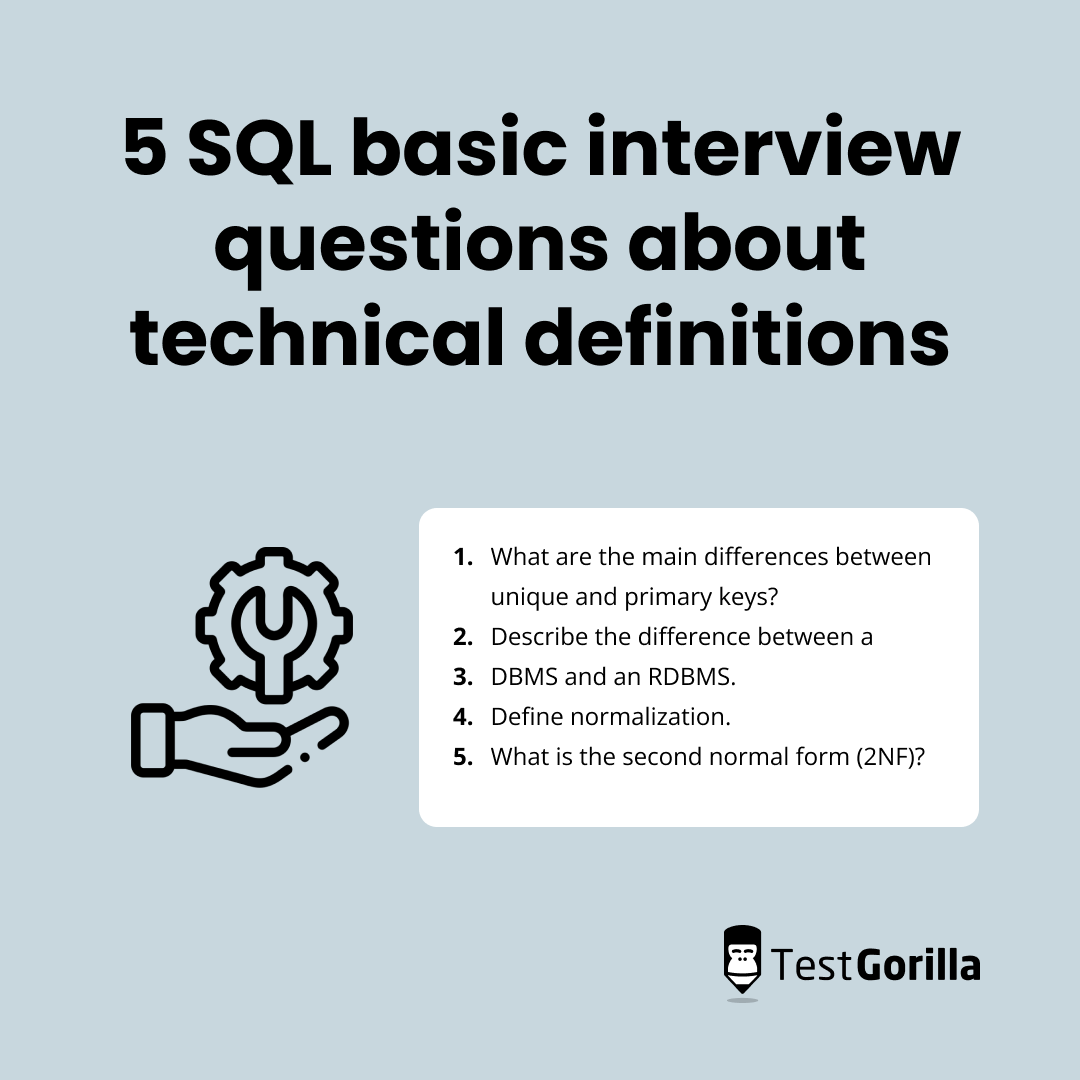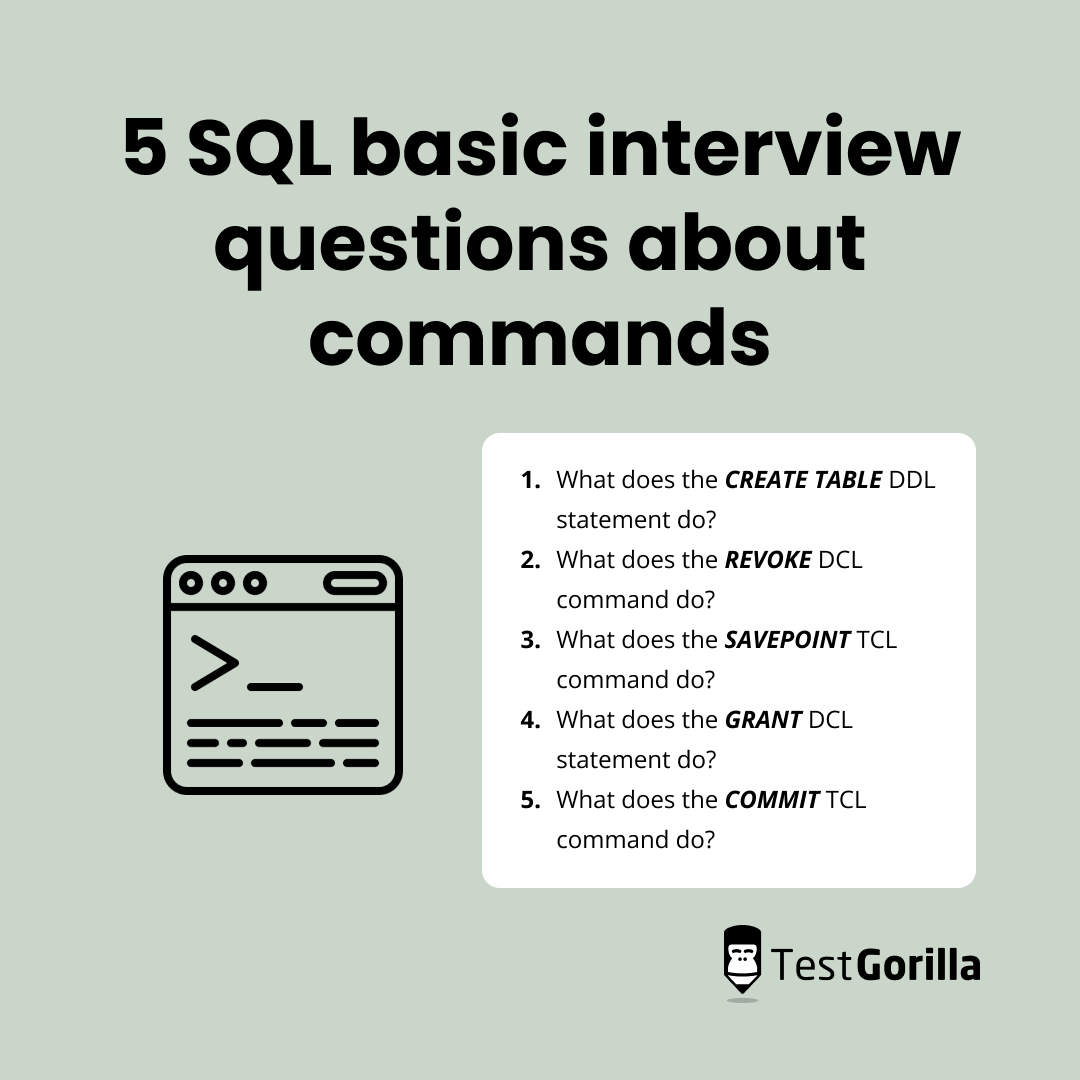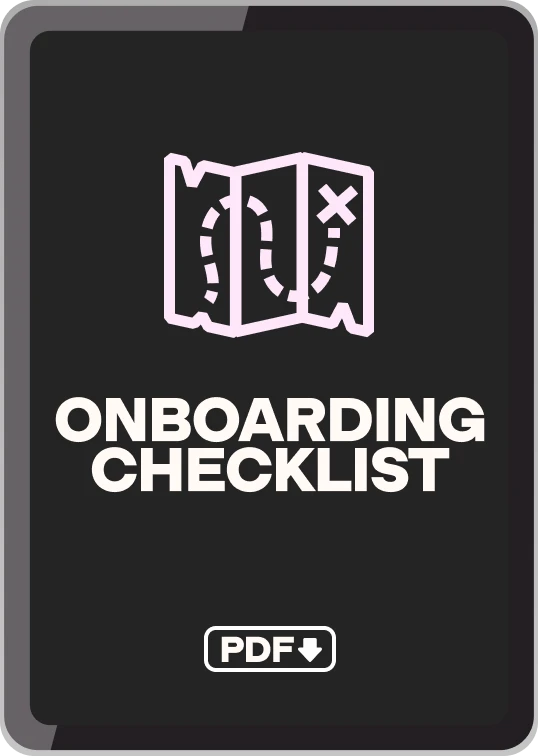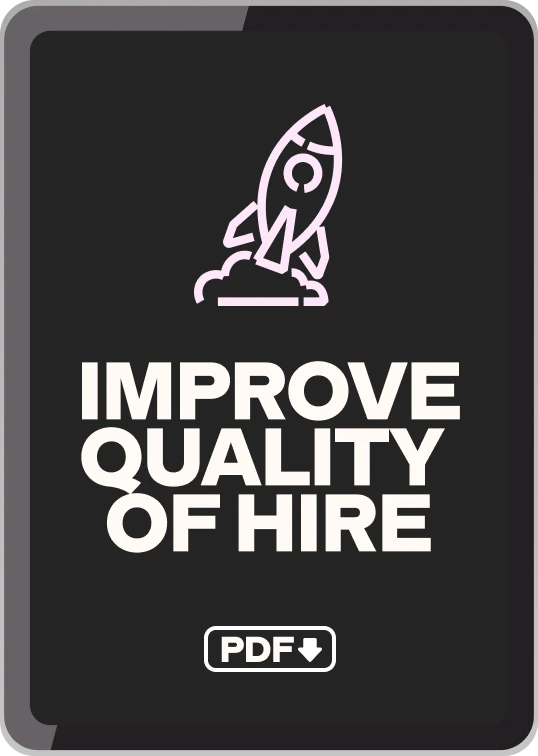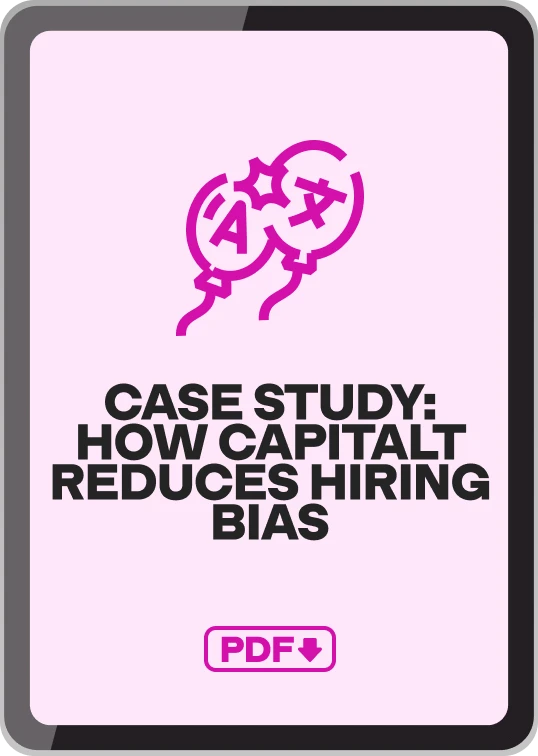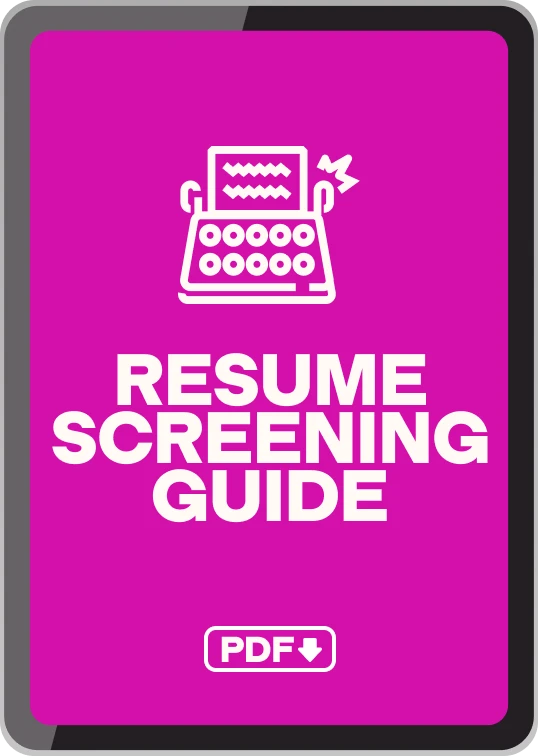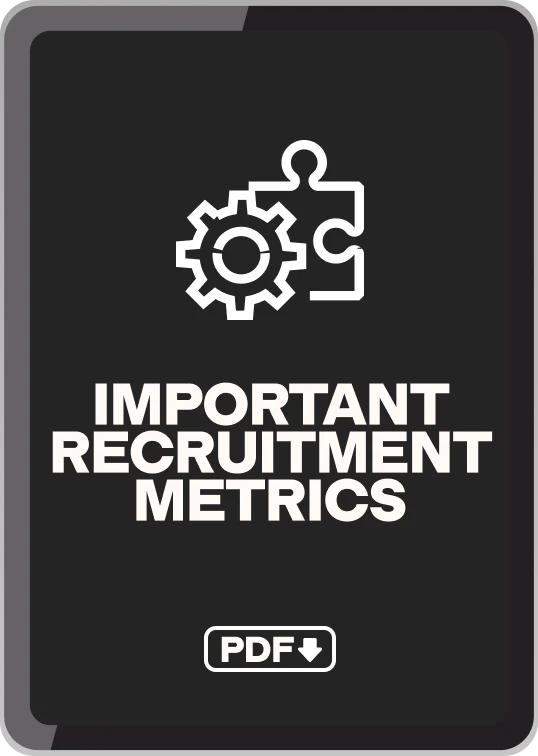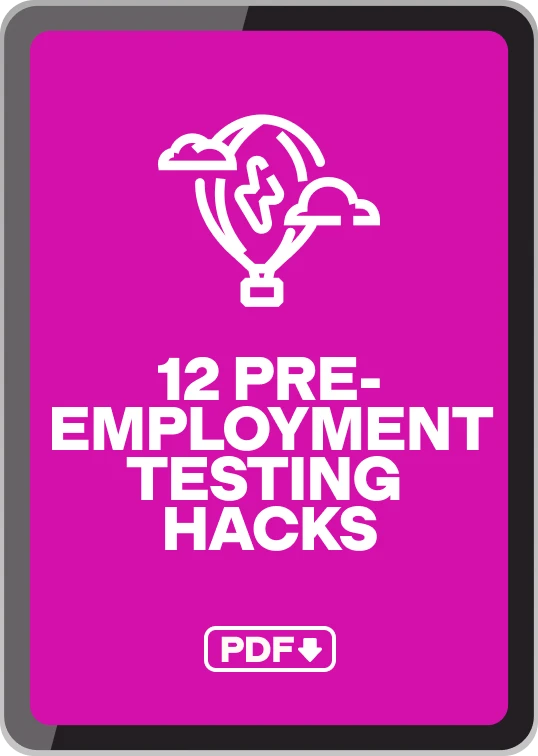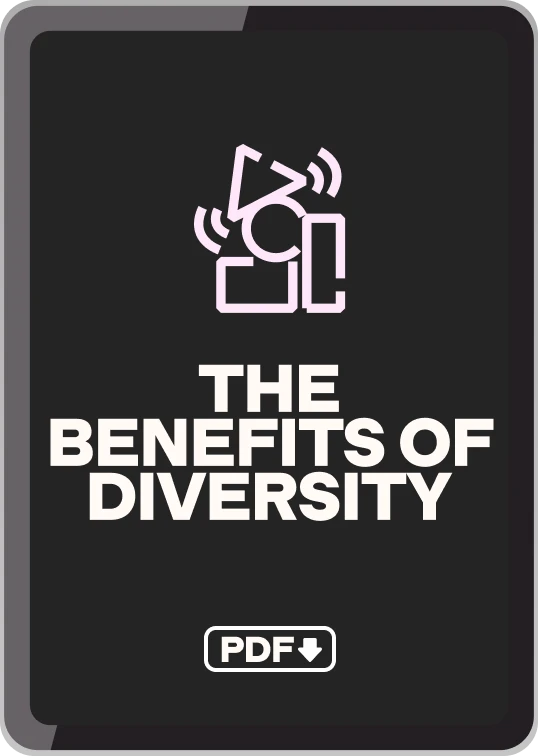50 SQL basic interview questions to ask talented engineers and developers
SQL developers complete many crucial database-related duties. Their contributions ensure your databases are stable and efficient and that the data is secure and consistent. If your projects involve database management, having a skilled SQL developer on your team is essential.
You should use a combination of two strategies to determine whether a software engineer matches your requirements.
Skills assessments featuring an entry-level SQL test can reduce your hiring workload and make candidate comparison faster, bias-free, and more efficient, whereas interviews can help you discuss your applicants’ knowledge and the perks of your organization.
How can you engage candidates and choose the right questions for the interview? Our 50 SQL basic interview questions are ideal if you’re hiring a junior SQL engineer. Check the questions in this article to prepare for the hiring process.
Table of contents
- 10 general SQL basic interview questions to assess software engineers
- 5 general SQL basic interview questions and answers
- 27 SQL basic interview questions about technical definitions
- 5 SQL basic interview questions and answers about technical definitions
- 13 SQL basic interview questions about commands
- 5 SQL basic interview questions and answers about commands
- Which 3 skills are important when hiring a junior SQL engineer for your company?
- How should you integrate skills testing into your hiring process?
- Why should you invite candidates to complete assessments before interviews?
- Find junior SQL engineers for your team with SQL basic interview questions
10 general SQL basic interview questions to assess software engineers
Begin the interview with these 10 general SQL basic interview questions to gather information about your applicants’ experience and knowledge.
1. Explain what SQL is and what it does.
2. Explain what databases are.
3. What is the difference between SQL and MySQL? How are they related?
4. What is a single-column index in SQL?
5. What is a composite-column index in SQL?
6. What is a unique index in SQL?
7. Define DBMS.
8. Define RDBMS.
9. Describe the functions of SQL indexes.
10. Name an ideal skill for integrating databases with software for business intelligence.
5 general SQL basic interview questions and answers
If you are a non-technical recruiter, check the answers to these five general SQL basic interview questions to gauge your applicants’ knowledge.
1. What is the difference between SQL and MySQL? How are they related?
Answers to this general SQL basic interview question will show you which candidates can differentiate between SQL and MySQL. Most entry-level developers should be prepared for this basic question.
They should respond that SQL is a programming language database engineers use to manage relational databases, whereas MySQL is an open-source relational database management system that uses SQL.
2. Explain what SQL is and what it does.
Junior SQL engineers should know that SQL is an acronym for structured query language. They may explain that it is the standard language for working with data in relational database management systems.
Skilled candidates will understand that SQL enables database engineers to store, retrieve, and modify data in a database.
3. What is a composite-column index in SQL?
Candidates who have used SQL in their current or previous roles will know that composite-column indexes are indexes on multiple columns. Good answers to this SQL basic interview question will also refer to clusters and explain that composite-column indexes can be non-clustered or clustered.
They may also mention that software engineers use composite-column indexes to optimize database queries.
4. Describe the functions of SQL indexes.
Software engineers use SQL indexes to quickly retrieve data from a database. Even though a user cannot see SQL indexes, they help speed up searches and queries. In other words, software developers may use indexes to look up records faster.
5. Name an ideal skill for integrating databases with software for business intelligence.
One skill SQL developers may require to integrate databases with software for business intelligence is knowledge of business intelligence software. For instance, software developers should know how Power BI and Tableau work. You can assess their understanding using our Power BI and Tableau skills tests.
Some subskills candidates may mention when responding to this question include database schema modification and building databases from scratch to meet the requirements of a specific business case.
27 SQL basic interview questions about technical definitions
Ask applicants some of these 27 SQL basic interview questions about technical definitions to determine if they have technical SQL knowledge and entry-level database management expertise.
1. Define normalization.
2. Describe the difference between a DBMS and an RDBMS.
3. What is the first normal form (1NF)?
4. What is the second normal form (2NF)?
5. What is the third normal form (3NF)?
6. What is the Boyce-Codd normal form?
7. Explain what a join is in SQL.
8. What is an inner join in SQL?
9. What is a left join in SQL?
10. What is a right join in SQL?
11. What is a full join in SQL?
12. Explain what DDL means.
13. Explain what DML means.
14. Explain what DCL means.
15. Explain what TCL means.
16. Define unique constraints in SQL.
17. Define default constraints in SQL.
18. What are the main differences between unique and primary keys?
19. Give us a definition of entities in SQL.
20. Give us a definition of relationships in SQL.
21. Tell me what you know about SQL subsets.
22. Name three applications of SQL.
23. Explain what a table refers to in SQL.
24. Explain what field means in SQL.
25. Are you familiar with primary keys? Explain what they do.
26. Tell me what you know about unique keys.
27. Are you familiar with foreign keys? Explain their purpose.
5 SQL basic interview questions and answers about technical definitions
Assess your SQL engineer applicants’ responses to these key SQL basic interview questions by checking the following sample answers to learn if they have the right technical knowledge.
1. What are the main differences between unique and primary keys?
Candidates with technical SQL knowledge can show their expertise by responding to this basic SQL interview question.
They may first explain that primary keys identify each record in a database table. There can only be one primary key, and it can’t store a NULL value. On the other hand, unique keys ensure values are unique within a table column. A table can have multiple unique keys, and they can store NULL values.
Listen for answers that provide a simple and clear definition and examples of situations in which the candidate has used primary and unique keys.
2. Describe the difference between a DBMS and an RDBMS.
DBMS means database management system. Engineers use such software systems to create, retrieve, update, and manage a database. They are ideal for ensuring the data is consistent, organized, and easy to access, and they act as an interface between the end users and the database.
RDBMS stands for relational database management system. These systems are used to manage data within a relational database.
Applicants may provide examples of the most popular RDBMSs, such as Oracle and MySQL, and explain some key differences between DBMSs and RDBMSs, such as the following:
RDBMSs can typically handle larger amounts of data than DBMSs
RDBMSs support several users, whereas DBMSs support just one user
RDBMSs often run faster than DBMSs
3. Define normalization.
If candidates have used SQL frequently, they will understand what normalization means. They may respond by explaining that normalization involves reducing data dependency and redundancy and improving data integrity.
When normalizing data, engineers follow various rules and guidelines to organize and restructure tables and fields in a database.
4. What is the first normal form (1NF)?
Ask applicants this SQL basic interview question to further test their technical knowledge of normalization.
Look for candidates who understand that relations in the first normal form (1NF) must contain an atomic value. If candidates fully understand normalization, they will know that this normalization rule states that a single cell should contain a single value, and each record must be unique.
5. What is the second normal form (2NF)?
Applicants with an in-depth understanding of normalization will know that the second normal form (2NF) adopts the rules of 1NF but also requires that the non-key attributes depend on the primary key.
Listen for responses that explain the links and differences between 1NF and 2NF.
13 SQL basic interview questions about commands
Determine whether your entry-level applicants understand SQL commands by asking them these SQL basic interview questions.
1. What does the CREATE TABLE DDL statement do?
2. What does the ALTER TABLE DDL command do?
3. What does the DROP TABLE DDL command do?
4. What does the INSERT DDL statement do?
5. What does the UPDATE DML command do?
6. What does the DELETE DML command do?
7. What does the GRANT DCL statement do?
8. What does the REVOKE DCL command do?
9. What does the COMMIT TCL command do?
10. What does the ROLLBACK TCL statement do?
11. What does the SAVEPOINT TCL command do?
12. What does the BEGIN TCL statement do?
13. What does the TRANSACTION TCL command do?
5 SQL basic interview questions and answers about commands
Check the accuracy and quality of your candidates’ responses by comparing them with these sample answers to important SQL basic interview questions.
1. What does the CREATE TABLE DDL statement do?
Database engineers should know that the CREATE TABLE command is one example of a DDL statement. If they have entry-level SQL experience, they’ll be aware that engineers use this command to create tables in a database and specify their structure and properties.
2. What does the REVOKE DCL command do?
Applicants with knowledge of SQL commands should know that the REVOKE command cancels privileges previously granted to database users. Candidates may also mention that this command can have several formats, depending on the type of privileges the engineer wants to revoke.
3. What does the SAVEPOINT TCL command do?
SAVEPOINT is a TCL command that engineers use in SQL to mark a transaction and allow every command executed after the savepoint to be rolled back. It restores the transaction to the state of the savepoint.
4. What does the GRANT DCL statement do?
The GRANT command enables engineers to provide users or roles privileges or permissions. This enables them to access and perform various actions on a database.
5. What does the COMMIT TCL command do?
Applicants should know that the COMMIT command saves any changes that transactions perform. It permanently saves any data manipulation alterations, including insertions, deletions, and updates (all of which will have happened since the previous commit or rollback).
Which 3 skills are important when hiring a junior SQL engineer for your company?
Since assessing applicants requires you to understand their skills, consider these three important SQL abilities before hiring a junior SQL engineer for your business.
1. Microsoft SQL Server skills
When hiring junior SQL engineers, ensure they have Microsoft SQL Server skills. They need to understand how this RDBMS works and how to operate it. This knowledge will help candidates use the popular server software to store and retrieve software application data.
There’s no easier way to review your candidates’ MS SQL Server skills than using our Microsoft SQL Server skills test. It will help you evaluate four skills:
Knowledge of SQL Server tools
Performance optimization
Database development skills
Security and administration skills
2. Problem-solving skills
Problem-solving skills are crucial for SQL developers and engineers who create software since they must solve problems related to the design process throughout the software development lifecycle.
Using our Problem Solving skills test to assess this skill has several advantages. You can evaluate applicants’ abilities to interpret data, apply logic, analyze textual and numerical information, create schedules, and prioritize problem-solving tasks.
This test is also ideal if you want to avoid unconscious bias when you choose someone to be your next SQL engineer.
3. PHP knowledge and skills
Since many developers use this popular scripting language to develop websites, it’s worth assessing your candidates’ PHP knowledge and skills.
PHP skills may not be necessary for every SQL project, but if your candidates are building a website, they may help them understand the interactions between websites and their data.
The simplest way to assess your applicants’ PHP knowledge is to use our PHP (Coding): Entry-Level Algorithms test. The test requires applicants to complete a short coding task – the results of which will help you learn which developer has the critical PHP skills you’re looking for.
How should you integrate skills testing into your hiring process?
The best way to integrate skills testing into your hiring process is to create skills assessments that include both SQL and soft-skills tests before interviewing SQL engineers or developers.
This process involves selecting skills tests to add to your assessment and then sending invitations to applicants to complete it. After your candidates complete the tests in the assessment, you create a shortlist of applicants based on their test results and then focus on interviewing the most qualified talent.
You can also ask applicants to answer custom questions related to SQL or provide a recorded video response to your custom question to determine how they would handle a live interview.
Why should you invite candidates to complete assessments before interviews?
Here are some of the main reasons to use skills assessments before interviews:
Save time: With just one glance at the results, you can check each candidate’s skills
Compare candidates easily: It’s easy to compare applicants’ knowledge and skills
Avoid hiring the wrong candidate: You can validate each candidate’s knowledge and check if they are a good match for your SQL developer role
Replace resume screening: Scanning through resumes is inefficient and prone to bias, but you can use skills assessments to replace this step entirely
Gather talking points for interviews: Based on applicants’ test results, you can dig deeper into their knowledge and skills when asking SQL interview questions
Find junior SQL engineers for your team with SQL basic interview questions
Hiring software developers can be easy with the right methods. With these SQL basic interview questions, you can learn about your applicants’ general, technical, and SQL command knowledge.
We recommend skills testing as an additional data-driven hiring method to find the most reliable information on your candidates’ skills. This handy strategy is ideal for non-technical recruiters. Even if you know nothing about SQL, you can trust expert-crafted skills tests to complete the candidate evaluation process.
Find junior SQL engineers for your team with basic SQL interview questions, and visit TestGorilla’s test library for the best skills tests and assessment features for your hiring process. Sign up for a free account to get started.
Related posts
You've scrolled this far
Why not try TestGorilla for free, and see what happens when you put skills first.
Latest posts
The best advice on pre-employment testing, in your inbox.
No spam. Unsubscribe at any time.

Hire the best. No bias. No stress.
Our screening tests identify the best candidates and make your hiring decisions faster, easier, and bias-free.
Free resources
This checklist covers key features you should look for when choosing a skills testing platform
This resource will help you develop an onboarding checklist for new hires.
How to assess your candidates' attention to detail.
Learn how to get human resources certified through HRCI or SHRM.
Learn how you can improve the level of talent at your company.
Learn how CapitalT reduced hiring bias with online skills assessments.
Learn how to make the resume process more efficient and more effective.
Improve your hiring strategy with these 7 critical recruitment metrics.
Learn how Sukhi decreased time spent reviewing resumes by 83%!
Hire more efficiently with these hacks that 99% of recruiters aren't using.
Make a business case for diversity and inclusion initiatives with this data.

